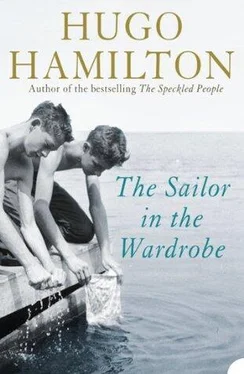‘Why be offended?’ my mother asks. ‘You can only be offended if you want to be.’
‘It’s aggression,’ my father says. ‘Naked aggression, deliberately walking through Catholic areas to provoke them.’
My mother keeps trying and I like the new way that she has found to argue with my father, a kind of talented optimism that drives him mad. She thinks you can win people over by capitulating, by being so friendly that the aggressor has nothing to fight against. She always told us not to be interested in winning, never to strike back, never to become like the fist people. She says they should invite the Loyalists into their areas and tell them they are welcome to march down their streets and make as much noise as they like. They should invite them into their houses for cups of tea and make little cakes for them with hundreds and thousands on top, because sooner or later the kindness will spread and they will stop getting any fun out of provocation. They both want the same thing in the end, don’t they, they both want peace. Who cares what flag you’re waving? In fifty years’ time, she says, they will all be marching together and it will be like one of those great street festivals they have in Rio de Janeiro, like the Fastnacht carnival in Germany, with people dancing all day and all night, and visitors coming from around the world to join in. It will be the festival of forgiveness, the festival of kindness winning over aggression.
My father shakes his head. ‘It won’t work,’ he says. ‘I’ve been up there. I’ve tried talking to them.’
He slaps his hand on his forehead and begins to make another speech. He says the Nationalists in Northern Ireland have tried everything. They tried capitulation, just like the Jewish people tried being soft and submissive in Germany and it didn’t work there either. Now it’s my father who starts putting Irish history through the German sieve. He always has to have the last word and says the Irish have to make their own noise. We have to make ourselves heard with our own language, our songs and poetry and stories, because that’s the only way to stop yourself from being drowned out and becoming extinct. You have to keep staying alive in your own language.
Day by day, things are getting worse up there with car bombs going off in the streets. My mother finds it hard to understand why. She cuts out a picture from the newspaper of a wrecked street and puts it into the diary along with all the other nightmares. You could see buildings almost completely destroyed, the windows blown out, curtains hanging out and injured people being brought away. At night in black and white, under the flash of cameras, the blood looks black and the faces very pale. People look dazed and half asleep as they walk away with their hair full of white dust. My mother says she saw lots of things like this before with her own eyes and it reminds her of Germany during the bombing of the cities. She takes in a sharp breath and shakes her head.
‘Schon wieder,’ she says. ‘Not again.’
She says it makes her sick. She saw this kind of thing during the war when she was bringing soup to Mainz. She knew the city when it was so beautiful. The next time she saw it she could hardly believe it was the same place. She kept losing her way. She said that some parts of the city just looked like open ground, with piles of rubble. Many of the buildings were cut down to half their size, with furniture and beds hidden underneath the debris. Some houses still had one or two walls left standing and you could see pictures hanging on their hooks and curtains untouched as if nothing had happened. She heard of people being killed by those falling walls, long after the bombing was over. You could see the horizon where a street had disappeared. Some of the houses left standing were black and burned out and still smoking. People were talking about phosphor as if it was some kind of disease that had spread across the city. They were saying that some of the people were not recognizable, they were so badly burned. People burned alive in the cellars like rags, holding on to each other, with cups and jugs lying beside them intact. One boy rescued his family from the inferno by breaking into a disused synagogue and finding a safe place in the basement. The survivors hurried away out to the country with some of their most precious belongings on carts. Nobody knew who was alive and who had fled. People were crying everywhere and calling each other. People digging through the rubble for their relatives even days after the bombing, calling out names and listening for an answer, covered in white dust. There were signs left up in chalk handwriting to let people know where the occupants could be found. In one of the streets there was a mass funeral, with lots of bodies lying out in a line, and my mother says she could hardly make the sign of the cross. She says she saw her own hand coming up in front of her eyes, shaking so much that she felt like an old woman.
Every time a bomb goes off on the street in Northern Ireland, I can see the look of fear in my mother’s eyes. My father too, because that’s not his way of fighting for survival.
‘It’s what they called moral bombing during the war,’ my father says. ‘The IRA are taking lessons from Churchill and Truman. Bombing cities. Bombing the vulnerable people and the children.’
‘It’s all the same nightmare factory,’ my mother says.
And then it’s time to change the subject. Pointing the finger doesn’t make you innocent, she says, as she takes out a German board game called ‘Mensch ärgere dich nicht’ which means: ‘Don’t let it get to you, man.’ It’s raining outside. There is no point in going down to the harbour, so I agree to play chess with my father. My mother puts on a lamp. There is music playing on the radio. She even takes out the bottle of cognac and pours a small glass for her and for my father, because she wants everything to be without resentment. She brings out a box of chocolates hidden in the press in the front room and it’s all chocolates and cognac smells and silence and Maria saying ‘Oh no’ when her luck runs out and she has to go back to the beginning. We’re all great winners and losers and everybody keeps playing and concentrating. The only noise you can hear is the rain outside and the sound of Bríd as she keeps breathing up and down. My mother puts her arms around her and looks over at the chess board to see how things are going between me and my father.
‘Whose move is it?’ she asks.
‘It’s my move,’ I tell her.
She admires the way we can play without speaking a word. My father taught me chess and I’ve only beaten him once, when he was still being polite, showing me my mistakes. For a long time we were courteous, warning each other about possible dangers. Mind your queen. Did you forget about your castle? It wasn’t about winning but more about learning and enjoying the great moves you could make. My father never wanted to win against me and I didn’t want to beat him either, so we kept avoiding the basic principle of chess. It was a kind of polite chess with no mean sneaky moves, no gambits. Now we’ve begun to take it seriously and don’t say a word. Even long after the others have stopped playing their board game, my father and I are still sitting across from each other, taking ages for each move.
‘Such concentration,’ my mother says. She admires the way we can become so involved in the one thing and leave all other thoughts behind. It looks like she wants to distract us, because she offers the chocolates one last time, taking off the cardboard sheet to reveal another full layer underneath. ‘Who would like a last chocolate, before they disappear?’
Everyone is looking at the box of chocolates and I pick out a toffee that is going to keep me going for a long time. My father looks at the pictures of the sweets and the names of all the different shapes. He picks out a caramel delight and puts it into his mouth. He chews silently. I try to chew without any noise, but I have a struggle on my hands with the toffee which is like a big football in my mouth.
Читать дальше
Конец ознакомительного отрывка
Купить книгу












